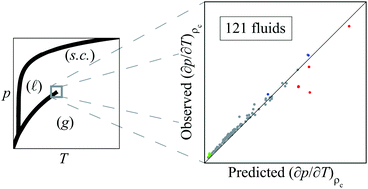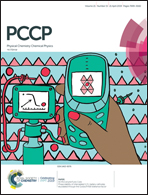Classical harmonic model for the behavior of pure fluids at the critical point†
Abstract
We present a simple model to explain the limiting behavior of many thermodynamic properties of pure classical fluids as one approaches the critical point. The model consists of four main aspects: (i) a focus on the thermodynamic properties as described by Fluctuation Solution Theory (FST); (ii) the removal of all intramolecular energy contributions from the FST expressions; (iii) particle fluctuations (and not the energy fluctuations) dominate the thermodynamics close to the critical point; and (iv) the equipartition theorem applies to the resulting low frequency collective modes of the fluid at the critical point. Using this approach, we predict and compare the thermodynamic results for 121 pure fluids as provided by accurate equations of state. The model explains why some ratios of diverging thermodynamic properties remain finite at the critical point, and reliably predicts the value of these ratios for equations of state that mimic both mean field and Ising system types, suggesting universal behavior.



 Please wait while we load your content...
Please wait while we load your content...